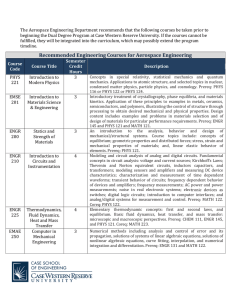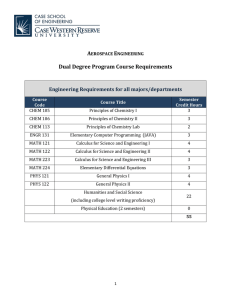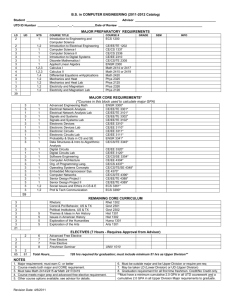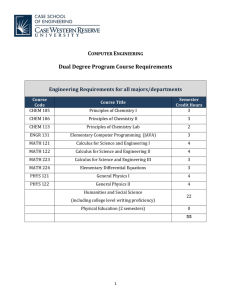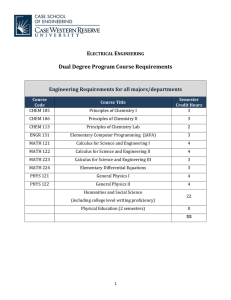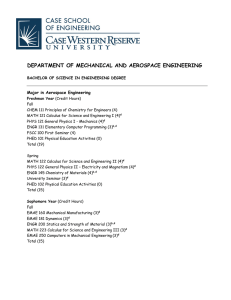M E Dual Degree Program Course Requirements
advertisement
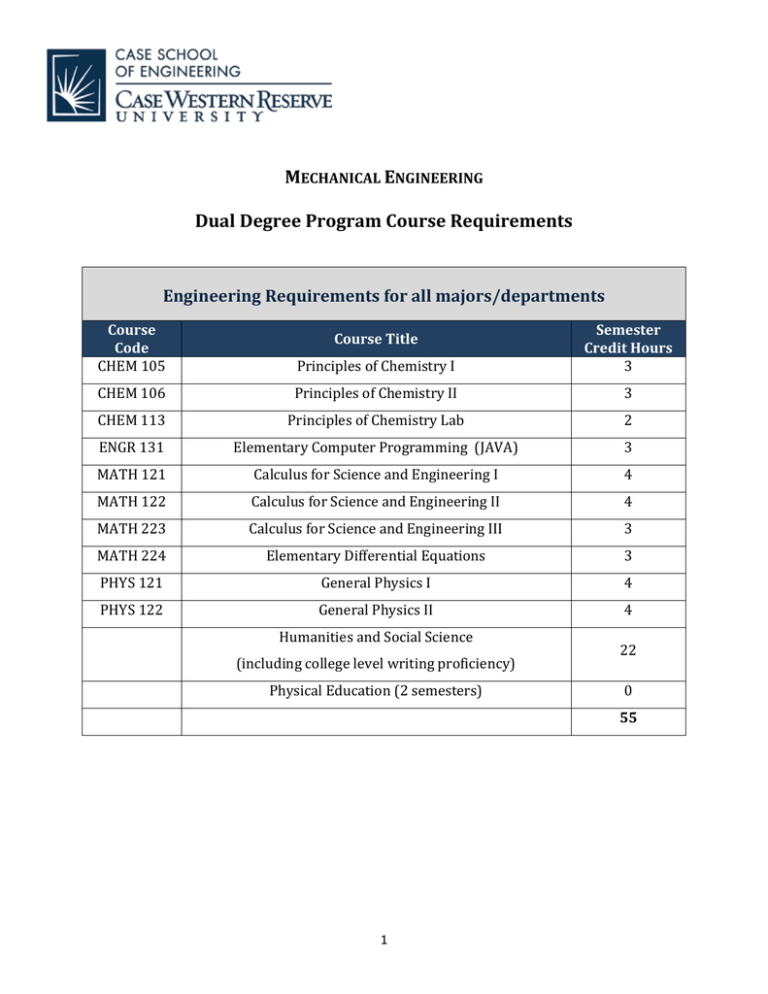
MECHANICAL ENGINEERING Dual Degree Program Course Requirements Engineering Requirements for all majors/departments Course Code CHEM 105 Principles of Chemistry I Semester Credit Hours 3 CHEM 106 Principles of Chemistry II 3 CHEM 113 Principles of Chemistry Lab 2 ENGR 131 Elementary Computer Programming (JAVA) 3 MATH 121 Calculus for Science and Engineering I 4 MATH 122 Calculus for Science and Engineering II 4 MATH 223 Calculus for Science and Engineering III 3 MATH 224 Elementary Differential Equations 3 PHYS 121 General Physics I 4 PHYS 122 General Physics II 4 Course Title Humanities and Social Science (including college level writing proficiency) Physical Education (2 semesters) 22 0 55 1 The Mechanical Engineering Department recommends that the following courses be taken prior to beginning the Dual Degree Program at Case Western Reserve University. If the courses cannot be fulfilled, they will be integrated into the curriculum, which may possibly extend the program timeline. Recommended Engineering Courses for Mechanical Engineering Semester Credit Description Hours Concepts in special relativity, statistical mechanics and quantum 3 Course Code Course Title PHYS 221 Introduction to Modern Physics ENGR 200 Statics and Strength of Materials 3 ENGR 210 Introduction to Circuits and Instrumentation 4 ENGR 225 Thermodynamics, Fluid Dynamics, Heat and Mass Transfer Computer in Mechanical Engineering 4 EMAE 250 3 mechanics. Applications to atomic structure, and selected topics in nuclear, condensed matter physics, particle physics, and cosmology. Prereq: PHYS 116 or PHYS 122 or PHYS 124. An introduction to the analysis, behavior and design of mechanical/structural systems. Course topics include: concepts of equilibrium; geometric properties and distributed forces; stress, strain and mechanical properties of materials; and, linear elastic behavior of elements. Prereq: PHYS 121. Modeling and circuit analysis of analog and digital circuits. Fundamental concepts in circuit analysis: voltage and current sources; Kirchhoff’s Laws; Thevenin and Norton equivalent circuits, inductors capacitors, and transformers; modeling sensors and amplifiers and measuring DC device characteristics; characterization and measurement of time dependent waveforms; transient behavior of circuits; frequency dependent behavior of devices and amplifiers; frequency measurements; AC power and power measurements; noise in real electronic systems; electronic devices as switches; digital logic circuits; introduction to computer interfaces; and analog/digital systems for measurement and control. Prereq: MATH 122. Coreq: PHYS 122. Elementary thermodynamic concepts: first and second laws, and equilibrium. Basic fluid dynamics, heat transfer, and mass transfer: microscopic and macroscopic perspectives. Prereq: CHEM 111, ENGR 145, and PHYS 121. Coreq: MATH 223. Numerical methods including analysis and control of error and its propagation, solutions of systems of linear algebraic equations, solutions of nonlinear algebraic equations, curve fitting, interpolation, and numerical integration and differentiation. Prereq: ENGR 131 and MATH 122. 2 Sample Course Sequence for Mechanical Engineering Fall Year 1 Subject Course Code Number EMAE 172 ENGR 200 EMAE 350 EMAE 250 ENGL 398N Course Title Introduction to Mechanical Manufacturing Statics and Strength of Materials Mechanical Engineering Analysis Computers in Mechanical Engineering Professional Communication Spring Year 1 Subject Course Course Title Code Number ECIV 310 Strength of Materials ENGR 225 Thermo, Fluid Dynamics, Mass & Heat Transfer EMAE 285 Mechanical Engineering Lab EMAE 181 Dynamics ENGR 210 Introduction to Circuits and Instrumentation Fall Year 2 Subject Course Course Title Code Number EECS 246 Introduction to Signals and EMAE 360 Engineering SystemsDesign Engineering Economics and OPRE 345 EMAE 325 Fluid andDecision ThermalMaking Engineering II Technical Elective Subject Code EMAE EMAE EMAE EMAE Spring Year 2 Course Course Title Number 271 Kinematics Analysis and Synthesis 370 Design of Mechanical Elements 398 Senior Project Design of Fluid and Thermal 355 Systems Technical Elective Technical Elective Hours per Week Class Lab 3 3 3 0 3 0 3 0 3 0 15 3 Hours per Week Class Lab 3 0 4 0 3 2 3 0 3 2 16 4 Hours per Week Class Lab 3 2 3 0 3 0 4 0 3 0 16 2 Hours per Week Class Lab 2 2 3 0 1 6 3 0 3 0 3 0 15 8 Semester Credit Hours 4 3 3 3 3 16 Semester Credit Hours 3 4 4 3 4 18 Semester Credit Hours 4 3 3 4 3 17 Semester Credit Hours 3 3 3 3 3 3 18 Please Note: The course sequence serves as an example of the classes necessary to complete the Dual Degree Program. Courses and the semesters taken will be based on the student’s transfer credit and discussion with the Case Western Reserve University faculty advisor. 3
